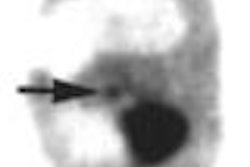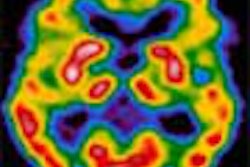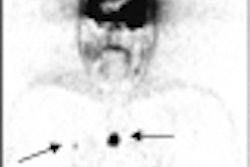Patients with diabetes -- women in particular -- tend to develop coronary artery disease more rapidly than the general population. Diabetic patients may also experience a higher-than-normal incidence of heart failure and myocardial infarction. A multi-institutional team looked at the role of SPECT stress myocardial perfusion imaging (MPI) in diabetic patients, and found that it can predict serious cardiac events in time to save lives. The results appear in Circulation: Journal of the American Heart Association.
Enrolled in this study were 4,755 patients from five different facilities, including Cedars-Sinai Medical Center in Los Angeles and Memorial Hospital of Rhode Island in Providence. The patients were prospectively followed for 2.5 years after initial testing.
Those who were able to exercise underwent symptom-limited exercise treadmill testing with an injection of either TI201 or Tc99m sestamibi at peak exercise. For SPECT MPI, 8-10 mCi of Tc99m was injected at rest, and 22-25 mCi was injected at peak stress (Cardiolite, Bristol-Myers Squibb Medical Imaging, North Billerica, MA).
Images were acquired using a single- or dual-head gamma camera over a 180° semicircular orbit extending from the 45° right anterior oblique to the 45° left posterior oblique positions. Two nuclear cardiologists reviewed the data and compared stress images to rest images.
Of the surviving patients, follow-up at one year was 97% complete. Of these 4,755 patients, 19.5% were diabetic. There were 80 cardiac events (8.61%) among the diabetic patients, and 172 cardiac events (4.5%) in the nondiabetic group.
"An abnormal MPI image was a significant predictor of cardiac death and myocardial infarction in both diabetic and nondiabetic populations," according to lead author Dr. Satyendra Giri from the University of Connecticut School of Medicine in Farmington. "However, a stepwise increase was more evident among nondiabetic patients because in diabetic patients, even single-vessel ischemia significantly increased the risk of death" (Circulation: Journal of the American Heart Association, January 1, 2002, Vol.105:1, pp. 32-40).
In addition, the presence of multivessel ischemia was the strongest predictor of total cardiac events, and a multivessel fixed defect was the greatest predictor of cardiac death in diabetic patients, they reported.
Also, "cardiac event rates were significantly higher among the 451 diabetic women (8%) than in the 1,635 nondiabetic women (3.2%)," the researchers wrote.
Finally, the group also found that the average cost of care was higher for diabetic patients ($2,705 per patient in 1995 U.S. dollars) than for nondiabetic patients ($1,688). "Patients with stable chest pain who are diabetic have higher diagnostic costs and greater rates of intervention and follow-up costs," they wrote.
While the study did have some limitations -- the threshold for diabetes diagnosis was based on a higher threshold than currently advocated by the World Health Organization, and patients in the study were referred for symptoms suggestive of coronary artery disease but not limited to chest pain -- the authors concluded that using stress MPI, jointly with clinical information, can provide risk stratification for diabetic patients.
This study was part of the Economics of Noninvasive Diagnosis (END) trial, which analyzes the effective allocation of medical resources in stable chest pain patients. In addition to the University of Connecticut, authors hailed from Emory University in Atlanta; Roger Williams Medical Center in Providence, RI; Duke University Medical Center in Durham, NC; Cedars-Sinai Medical Center in Los Angeles; and St. Louis University Health Sciences Center.
By Shalmali PalAuntMinnie.com staff writer
January 14, 2002
Related Reading
Copyright © 2002 AuntMinnie.com



















